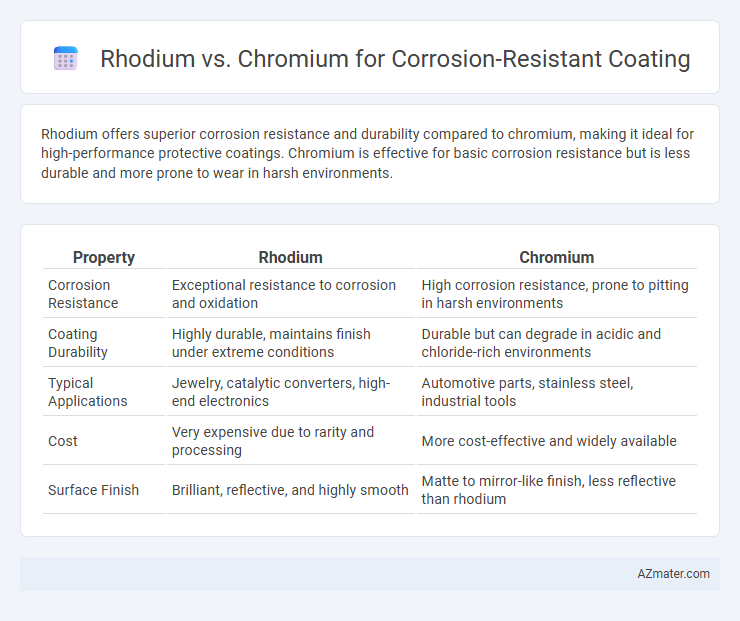Rhodium offers superior corrosion resistance and durability compared to chromium, making it ideal for high-performance protective coatings. Chromium is effective for basic corrosion resistance but is less durable and more prone to wear in harsh environments.
Table of Comparison
| Property | Rhodium | Chromium |
|---|---|---|
| Corrosion Resistance | Exceptional resistance to corrosion and oxidation | High corrosion resistance, prone to pitting in harsh environments |
| Coating Durability | Highly durable, maintains finish under extreme conditions | Durable but can degrade in acidic and chloride-rich environments |
| Typical Applications | Jewelry, catalytic converters, high-end electronics | Automotive parts, stainless steel, industrial tools |
| Cost | Very expensive due to rarity and processing | More cost-effective and widely available |
| Surface Finish | Brilliant, reflective, and highly smooth | Matte to mirror-like finish, less reflective than rhodium |
Introduction to Corrosion Resistant Coatings
Corrosion resistant coatings protect metal surfaces from oxidation, chemical damage, and environmental wear, enhancing durability in harsh conditions. Rhodium offers exceptional corrosion resistance due to its inertness and high reflectivity, making it ideal for fine jewelry and electronic connectors. Chromium, widely used in automotive and industrial applications, provides a hard, corrosion-resistant layer that improves surface hardness and abrasion resistance.
Overview of Rhodium as a Coating Material
Rhodium as a coating material offers exceptional corrosion resistance due to its inert chemical properties and high reflectivity, making it ideal for applications in harsh environments. It forms a thin, durable layer that protects underlying metals from oxidation and tarnishing, surpassing chromium in resistance to acids and chemical exposure. Its scarcity and cost often limit usage to decorative and high-performance industrial coatings where longevity and appearance are critical.
Properties of Chromium in Coating Applications
Chromium exhibits exceptional hardness and excellent resistance to oxidation, making it a preferred choice for corrosion-resistant coatings in industrial applications. Its ability to form a stable, adherent oxide layer ensures long-lasting protection against environmental degradation and chemical exposure. Chromium coatings also provide enhanced wear resistance and maintain surface integrity under extreme temperatures, contributing to their widespread use in automotive and aerospace industries.
Corrosion Resistance: Rhodium vs Chromium
Rhodium offers superior corrosion resistance compared to chromium due to its noble metal properties, providing exceptional protection against oxidation, acids, and tarnishing in harsh environments. Chromium coatings, while effective in enhancing corrosion resistance through the formation of a passive oxide layer, tend to degrade under prolonged exposure to harsh chemicals and high humidity. Rhodium's inertness and resistance to chemical attack make it the preferred choice for high-performance corrosion-resistant coatings in automotive, aerospace, and jewelry applications.
Durability and Longevity Comparison
Rhodium offers superior corrosion resistance and exceptional durability due to its higher resistance to oxidation and chemical attack compared to chromium. While chromium coatings provide good hardness and moderate corrosion protection, rhodium outperforms by maintaining a bright, tarnish-free surface over extended periods in harsh environments. The longevity of rhodium plating ensures longer-lasting protection for automotive, jewelry, and electronic components, resulting in reduced maintenance and replacement costs.
Aesthetic Differences: Finish and Appearance
Rhodium coatings exhibit a brighter, highly reflective finish compared to chromium, offering a striking mirror-like appearance that enhances jewelry and luxury items. Chromium provides a more subdued, matte or semi-gloss finish with a slightly grayish tone, making it ideal for industrial and automotive applications prioritizing durability over brilliance. The superior brilliance and whiteness of rhodium create a more premium and visually appealing surface, while chromium's finish is appreciated for its practical, less flashy aesthetic.
Industrial and Commercial Applications
Rhodium offers superior corrosion resistance and reflectivity, making it ideal for high-performance industrial coatings in electronics and automotive components. Chromium remains a cost-effective choice for commercial applications, providing robust protection against oxidation and wear in construction and machinery. The selection between rhodium and chromium coatings depends on balancing durability requirements with budget constraints in industrial and commercial environments.
Environmental Impact and Safety Considerations
Rhodium coatings offer superior corrosion resistance with minimal environmental toxicity compared to chromium, which often involves hexavalent chromium compounds known for their carcinogenic risks and stringent disposal regulations. The extraction and refining of rhodium produce lower ecological footprints due to less hazardous waste generation, enhancing workplace safety and reducing environmental contamination. Protective coatings utilizing rhodium contribute to safer industrial practices by minimizing exposure to harmful substances prevalent in chromium plating processes.
Cost Analysis: Rhodium vs Chromium Coatings
Rhodium coatings exhibit superior corrosion resistance and durability compared to chromium but come at a significantly higher cost, often exceeding chromium prices by several folds due to rhodium's rarity and extraction complexity. Chromium coatings offer a more economical solution with adequate corrosion protection for many industrial applications, making them popular in sectors balancing performance and cost. Choosing between rhodium and chromium coatings depends largely on budget constraints and desired longevity, with rhodium favored for high-end, long-lasting finishes despite its premium price.
Choosing the Right Metal: Key Considerations
Rhodium offers superior corrosion resistance and exceptional reflectivity, making it ideal for high-end applications requiring durability and aesthetic appeal. Chromium provides cost-effective corrosion protection with good hardness but may require additional treatments to prevent tarnishing in harsh environments. Selecting between rhodium and chromium depends on factors such as budget constraints, environmental exposure, and desired coating lifespan.

Infographic: Rhodium vs Chromium for Corrosion Resistant Coating
 azmater.com
azmater.com